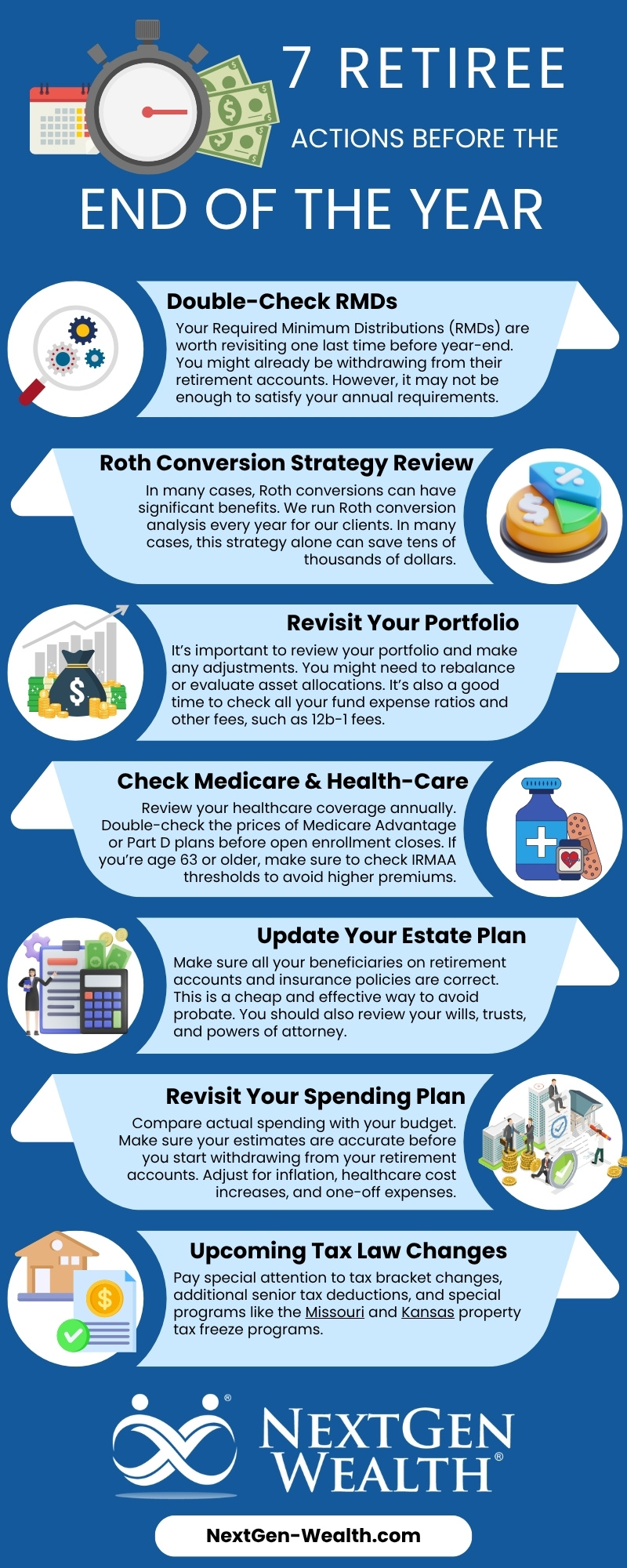The Top 7 Things Retirees Need to Do Before the End of 2025

Before 2025 ends, retirees need to make sure they’ve covered all their bases for taxes, charitable giving, RMDs, and more. With recent changes from the One Big Beautiful Bill Act, there’s even more to consider for your retirement checklist. Whether you’re thinking about retirement, currently transitioning into retirement, or are already fully retired, there are many items on the to-do list.
You don’t want to wait until the last minute either. In many cases, you’ll need assistance from your accountant or financial planner to check everything off your list. In many cases, failing to act now could trigger penalties, which is a bad way to start the new year. Once January 1st rolls around, the tax year for 2025 is closed, and there’s no turning back!
Table of Contents
- Double-Check Your Required Minimum Distributions (RMDs)
- Review Your 2025 Tax and Roth Conversion Strategy
- Revisit Your Portfolio
- Check Medicare and Health-Care Costs Before Open Enrollment Closes
- Update Your Estate Plan and Beneficiaries
- Revisit Your 2025 Spending and Withdrawal Plan
- Looking Ahead to 2026 and Upcoming Tax Law Changes
- The Final Stretch of the Year
Double-Check Your Required Minimum Distributions (RMDs)
It can get really expensive if you miss taking your Required Minimum Distributions (RMDs) for the year. Out of all the annual checks, RMDs are worth revisiting one last time before the end of the year.
In theory, most people are already withdrawing from their retirement accounts. However, it may not be enough to satisfy your requirements for the year.
We suggest starting with a list of all accounts subject to RMDs. These include any “traditional” accounts, such as IRAs and 401(k)s. If you have any inherited accounts, you’ll need to make sure you understand the latest IRS ruling for inherited accounts, too.
Next, you can calculate your RMDs for the year. You must make the required withdrawals before December 31st. You can use IRS Publication 590-B to help you determine your RMDs or consult your financial planner.
Consider Qualified Charitable Distributions (QCDs)
If you’re charitably inclined, you can make a “qualified” charitable distribution (QCD) toward your RMDs for the year. Make sure you’re paying attention to the order of distributions. It’s always best to take the QCD first before any other distribution.
Double Check RMDs Before Year’s End
It’s always best to check your RMDs and QCDs one last time before the end of the year. Also, be sure to keep copies of all relevant paperwork and emails for future reference. It’s essential to ensure that all your tax documents are in order.
If you did complete a QCD, be sure to note it on your tax return. This is a commonly missed distribution type.
Review Your 2025 Tax and Roth Conversion Strategy
Roth conversions are a very popular way to reduce your lifetime tax bill. They’re also a great way to lower the tax burden for your heirs. It’s often best to analyze Roth conversion opportunities toward the end of the year, so you have a more accurate estimate of your income.
It’s even more important to revisit Roth conversions for 2025 through 2028 due to the increased deductions available to taxpayers aged 65 and older. This means you could convert more of your IRA to Roth each year. It’s best to coordinate with your CPA or financial planner.
In many cases, Roth conversions can have significant benefits. We run Roth conversion analysis every year for our clients. In many cases, this strategy alone can save tens of thousands of dollars.
Revisit Your Portfolio
It’s important to review your portfolio and make any adjustments. You may need to rebalance or reassess your asset allocations. For the most part, a properly diversified portfolio doesn’t require any major changes.
You also want to check on any bonds or certificates of deposit maturing soon. You’ll need to ensure that you reinvest those funds in line with your current goals.
Investment Expenses Audit
It’s also a good time to check all your fund expense ratios and other fees, such as 12b-1 fees. To be clear, all investments have some direct or indirect costs. These fees and expense ratios generally don’t change much, but it’s a good idea to check.
Check Medicare and Health-Care Costs Before Open Enrollment Closes
It’s always a good idea to review your healthcare coverage annually. Make sure to double-check the prices of your Medicare Advantage or Part D plan before open enrollment closes. You’ll also want to compare coverage, premiums, and prescription drug coverage (formularies).
If you’re age 63 or older, make sure to check IRMAA thresholds to avoid higher premiums. Your Medicare premium adjustments are based on your tax return from two years ago. You don’t want to increase your taxable income too much if you don’t have to.
You may also want to reevaluate your Medicare supplement (Medigap) policy coverage. There may be new providers in your area, or mergers among insurance companies could change costs and coverage.
Assess Long-Term Care Insurance Needs and Costs
If you haven’t planned for long-term care insurance yet, it’s time to start thinking about it. In some cases, you may be able to convert an existing life insurance policy to get the coverage you need. Every situation is different, so be sure to shop around.
Update Your Estate Plan and Beneficiaries
Life happens every day, and sometimes beneficiaries need to be changed. Ensure that all beneficiaries listed on your retirement accounts and insurance policies are accurate. This is a cheap and effective way to avoid probate.
Likewise, you should also review your wills, trusts, and powers of attorney. If you have a trust, it’s important to ensure all assets are titled in accordance with your estate plan. A trust does no good if you don’t actually move assets into it.
Executors and Estate Attorneys
If you haven’t touched base with the executor of your estate, it’s a good time to touch base. You’ll want to verify their contact information at a minimum. Also, if they don’t know you’ve named them as your executor, now’s a good time to let them know.
If you need major updates, it’s best to schedule a review with your estate attorney. It’s not fun to plan your exit, but a thoughtfully planned and organized estate is an invaluable gift to your loved ones.
Revisit Your 2025 Spending and Withdrawal Plan
It’s a good idea to compare your actual spending with your budget. You want to make sure your estimates are accurate before you start taking withdrawals from your retirement accounts. Retirement looks different for everyone, so your spending may change more than you think.
It’s also a good idea to adjust for inflation, healthcare cost increases, and one-time expenses (such as a classic car or a big vacation). It might also be a good time to calculate your Social Security benefits if you haven’t started withdrawing yet.
Looking Ahead to 2026 and Upcoming Tax Law Changes
The One Big Beautiful Bill Act made some significant changes for retirees. You’ll want to pay special attention to changes like the extension of TCJA-era tax brackets and additional senior tax deductions. It’s also a good idea to check other programs, such as the Missouri and Kansas property tax freeze programs.
The Final Stretch of the Year
If you’re not careful, the year will be over, and so will opportunities to take advantage of tax-saving strategies and more. Once you enter the holiday season, it feels like a time warp. It’s better to have everything covered before it’s time to carve the Thanksgiving turkey (or brisket for you barbecue lovers).
At NextGen Wealth, we’ve been working with our clients throughout the year, so there won’t be any surprises. For inspiration on what to check, you can download a copy of our annual service schedule here.
If you’d like to see how collaborating with a financial planner can help you achieve financial peace of mind, reach out. Contact us today to schedule your no-obligation financial assessment and see if we’re a good fit.



